
ANNUAL REPORT 2020
Issued: July 1, 2021

OFFICE OF THE GOVERNOR STATE CAPITOL
MONTGOMERY, ALABAMA 36130
KAY IVEY (334) 242-7100
GOVERNOR FAX: (334) 242-0937
STATE OF ALABAMA
July 1, 2021
Dear Friends,
I am proud to serve as Alabama’s 54
th
Governor and lead our great state. One of
the areas of state government that I am most proud of is the Alabama Department
of Early Childhood Education (ADECE).
Ensuring our youngest learners have a strong start to their educational journeys is
important now, more than ever. The programs administered by the ADECE are
critical components of our workforce development system. I want to do
everything possible to make sure that our citizens can enter the workforce
prepared for 21
st
century jobs. With volumes of research which prove that 95%
of brain development occurs by age 5, the programs of the ADECE are valuable
investments in our state’s future.
Alabama continues to set the nationwide bar through our success with the Alabama First Class Pre-K program. In
April 2021, we welcomed the news that Alabama continues to be a national leader in pre-k for the 15
th
consecutive year. On May 21, 2021, the ADECE was featured as one of four states in the Rutgers University
publication “Effective Early Learning State Offices.”
The Strong Start, Strong Finish initiative continues to move our state forward. Through the Pre-K – 3
rd
Grade
Integrated Approach to Early Learning, we can provide more tools for teachers and school leaders so they can
continue providing students with the best models for learning in the critical early years.
On July 1, 2020, I was glad to select Dr. Barbara J. Cooper as the newest Secretary of the ADECE. She is an
outstanding leader in my cabinet and continues to do an excellent job leading the department. This annual report
highlights progress made with many of the department’s initiatives.
Because of the work of the ADECE, Alabama’s future for children and families is bright! I urge everyone to join
with us to improve access to the department’s valuable programs so that all children in our state can flourish.
Sincerely,
Kay Ivey
Governor
Dear Friends,
When Governor Ivey appointed me as Secretary of the Alabama Department of Early Childhood
Education (ADECE), she emphasized the priority to ensure the Alabama First Class Pre-K program
remained the highest quality, while providing access for more children. One of the values that drives my
work is ensuring an equitable education for all children. Each day, I work to lead our team in being
accountable for making our organization better and stronger through high-quality learning opportunities
for all.
When children aren’t afforded positive early experiences, gaps begin emerging and the gaps between
advantaged and disadvantaged children are visible as early as 9 months of age. By 18 months, toddlers
from low-income families can already be several months behind in language development and other
milestone indicators. These gaps continue to widen, leaving disadvantaged children up to two years
behind by age five. The most productive way to close achievement gaps is to keep them from occurring by
providing high-quality early childhood programs. The achievement gap neither originates nor can it be
closed by schools alone. After all that we have experienced during the COVID-19 pandemic, earlier
support for families and children is even more critical.
Investments provided to the ADECE allow us to prevent disparities by working with families to provide a
strong early start for children. The programs we administer provide everything needed for both a strong
family foundation as well as the education Alabama’s children need to enter the K-12 school system ready
to learn.
Before a child enters pre-k, social connections and important brain-building work is happening between
caregivers and parents of young children. Again, the pandemic made clear the need for supporting
families as their child’s first teacher through the First Teacher Home visiting program.
The ADECE continues to implement evidence-based, nationally researched programs for parents and
children, which data show are effective at increasing school readiness and improving child and family
outcomes. We also realize that a child’s early education does not end in pre-k. Through Governor Ivey’s
Strong Start, Strong Finish Initiative, we are intentional in our partnering with local school systems and
others in our mixed delivery system to ensure what is learned in early childhood continues through the
child’s third-grade year and beyond. We also continue our efforts in workforce development in multiple
ways including an apprenticeship program. Investments in the workforce support our commitment to
having highly qualified teachers serving and teaching our youngest children. Weaving through all our
work is Alabama Family Central, a website with a broad range of resources for parents and families to
access as they navigate the many early childhood programs across the state. Alabama Family Central was
developed throughout 2020 and launched in January of 2021.
This report serves as an update of where we are focusing our efforts and identifies how we are moving
forward. Thank you to my team and to everyone who has contributed tirelessly to making the ADECE a
national leader in early childhood education and a key to the success of Alabama’s future.
Educationally,
Dr. Barbara Cooper, Secretary
Alabama Department of Early Childhood Education

2020 Annual Report 3
Dear Friends,
When Governor Ivey appointed me as Secretary of the Alabama Department of Early Childhood
Education (ADECE), she emphasized the priority to ensure the Alabama First Class Pre-K program
remained the highest quality, while providing access for more children. One of the values that drives my
work is ensuring an equitable education for all children. Each day, I work to lead our team in being
accountable for making our organization better and stronger through high-quality learning opportunities
for all.
When children aren’t afforded positive early experiences, gaps begin emerging and the gaps between
advantaged and disadvantaged children are visible as early as 9 months of age. By 18 months, toddlers
from low-income families can already be several months behind in language development and other
milestone indicators. These gaps continue to widen, leaving disadvantaged children up to two years
behind by age five. The most productive way to close achievement gaps is to keep them from occurring by
providing high-quality early childhood programs. The achievement gap neither originates nor can it be
closed by schools alone. After all that we have experienced during the COVID-19 pandemic, earlier
support for families and children is even more critical.
Investments provided to the ADECE allow us to prevent disparities by working with families to provide a
strong early start for children. The programs we administer provide everything needed for both a strong
family foundation as well as the education Alabama’s children need to enter the K-12 school system ready
to learn.
Before a child enters pre-k, social connections and important brain-building work is happening between
caregivers and parents of young children. Again, the pandemic made clear the need for supporting
families as their child’s first teacher through the First Teacher Home visiting program.
The ADECE continues to implement evidence-based, nationally researched programs for parents and
children, which data show are effective at increasing school readiness and improving child and family
outcomes. We also realize that a child’s early education does not end in pre-k. Through Governor Ivey’s
Strong Start, Strong Finish Initiative, we are intentional in our partnering with local school systems and
others in our mixed delivery system to ensure what is learned in early childhood continues through the
child’s third-grade year and beyond. We also continue our efforts in workforce development in multiple
ways including an apprenticeship program. Investments in the workforce support our commitment to
having highly qualified teachers serving and teaching our youngest children. Weaving through all our
work is Alabama Family Central, a website with a broad range of resources for parents and families to
access as they navigate the many early childhood programs across the state. Alabama Family Central was
developed throughout 2020 and launched in January of 2021.
This report serves as an update of where we are focusing our efforts and identifies how we are moving
forward. Thank you to my team and to everyone who has contributed tirelessly to making the ADECE a
national leader in early childhood education and a key to the success of Alabama’s future.
Educationally,
Dr. Barbara Cooper, Secretary
Alabama Department of Early Childhood Education

4 Alabama Department of Early Childhood Education
The Alabama Department of Early Childhood Education (ADECE) is an executive, cabinet-level
state agency, principally established to enable the Governor to eectively and eciently coordinate
eorts and programs to serve families and children throughout the state. The Department is the
state designee for the federally mandated Early Childhood Advisory Council (designated as the
Alabama Children’s Policy Council in 2015), home of the Alabama Head Start Collaboration Oce,
administrator of the Children First Trust Fund, the lead agency for early learning and home visiting
programs, and developer and operator of the nationally-recognized Alabama First Class Pre-K
program. The Department receives and disburses any funds appropriated by state and federal sources
for the establishment, operation, and administration of its programs.
The ADECE was created in 2015 to expand upon the duties of the former Department of Children’s
Aairs to include the development of a cohesive and comprehensive system of high-quality early
learning and care experiences for Alabama’s families and children, aged birth through eight. The
Department consists of the Oce of School Readiness, Oce of Family Support, Head Start
Collaboration Oce, and the Oce of Early Childhood Development and Professional
Support.
FISCAL YEAR 2020 HIGHLIGHTS:
As the COVID-19 pandemic had a substantial impact on educational institutions throughout
Alabama and the country, the ADECE responded so that Alabama’s children and families
continued to receive benets from the programs that it operates. Over 20,000 backpacks
with supplies and educational materials were distributed to First Class Pre-K students
throughout the state. First Teacher Home Visiting programs conducted over 54,000 in-
person and virtual visits in all 67 counties.
On July 1, 2020, Governor Kay Ivey appointed Dr. Barbara J. Cooper to be the new Secretary
of the Department of Early Childhood Education, replacing Jeana Ross who retired in May
2020.
Alabama was one of 23 states awarded a three-year Preschool Development Grant Birth
to 5 (PDG B-5) renewal grant for almost $11.2 million annually designed to implement the
strategic plan developed with the 2018 PDG B-5 planning grant.
National Recognition:
• More than 30 presentations to national audiences
• 3 published research articles
• 78 news stories about the ADECE and its success
ABOUT THE DEPARTMENT
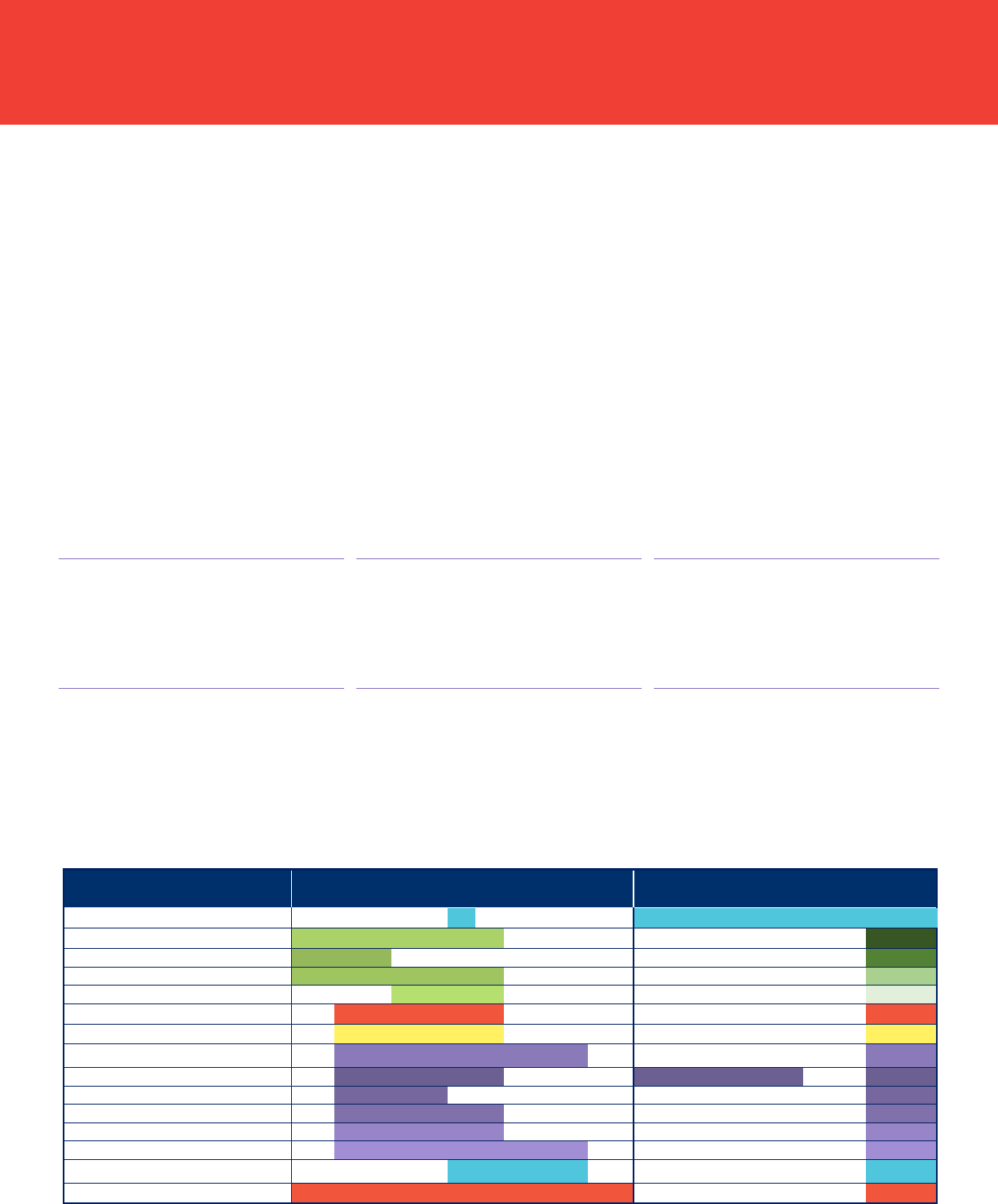
2020 Annual Report 5
Covid-19 Response
The ADECE responded to the disruptions in the education system caused by the COVID-19 pandemic by rst
listening to the needs of educators and families to develop and implement an intentional, comprehensive plan.
Alabama’s strategy was nationally recognized, and Secretary Barbara Cooper was invited to share our plan with
other states.
To ensure that children and families had supplies that supported learning in their homes, the ADECE team
distributed more than 20,000 backpacks full of materials to complement virtual learning. These learning
kits contained activity cards, crayons, paint, manipulatives, playdough, and other materials that support the
domains of learning in the Alabama Standards for Early Learning and Development.
Teachers who had to navigate the most challenging learning environment in more than a generation
were constantly supported through virtual small groups and one-on-one reective coaching. The ADECE
continuously innovated to meet the needs of those we serve during this dicult period.
NUMBERS:
Prenatal Birth 1 2 3 4 5 6 7 8
918
Pay Parity
Apprenticeship
& CTE
Scholarships
Professional
Development
First Class Pre-K Age 4
First Teacher Home Visiting Prenatal - Age 5
Nurse Family Partnership Model Prenatal up to Age 2
Parents as Teachers Model Prenatal - Age 5
HIPPY Model Age 2 - Age 5
Head Start Collaboration Office Birth - Age 5
Infant and Early Childhood Mental Health Birth - Age 5
Office of Early Childhood Development
and Professional Support
Birth - Age 8
Birth to 5 Foundation Sites Birth - Age 5
Early Head Start-Child Care Partnership Birth - Age 3
Family Engagement Project Birth - Age 5
Challenging Behaviors Project Birth - Age 5
Conscious Discipline Project Birth - Age 8
Preschool to Third Grade
Integrated Approach
Age 4 - Age 8
Children's Policy Council Prenatal - Age 18
Program
Age of Population Served
Workforce Supports
20,439
Children enrolled in Alabama
First Class Pre-K in 2019-2020,
an increase of 3,219 children
from the prior year.
$6,008
State spending per child
in 2019-2020, up $354 from 2018-
2019, adjusted for ination.
14 Years
Alabama met 10 of 10 quality
standards benchmarks established
by the National Institute for Early
Education Research (NIEER), for
the 14th consecutive year.
60,000
books distributed for
home libraries
20,000
learning kits
distributed
3,000
early learning professionals
participated in virtual
ECE conference
Continuum of Services
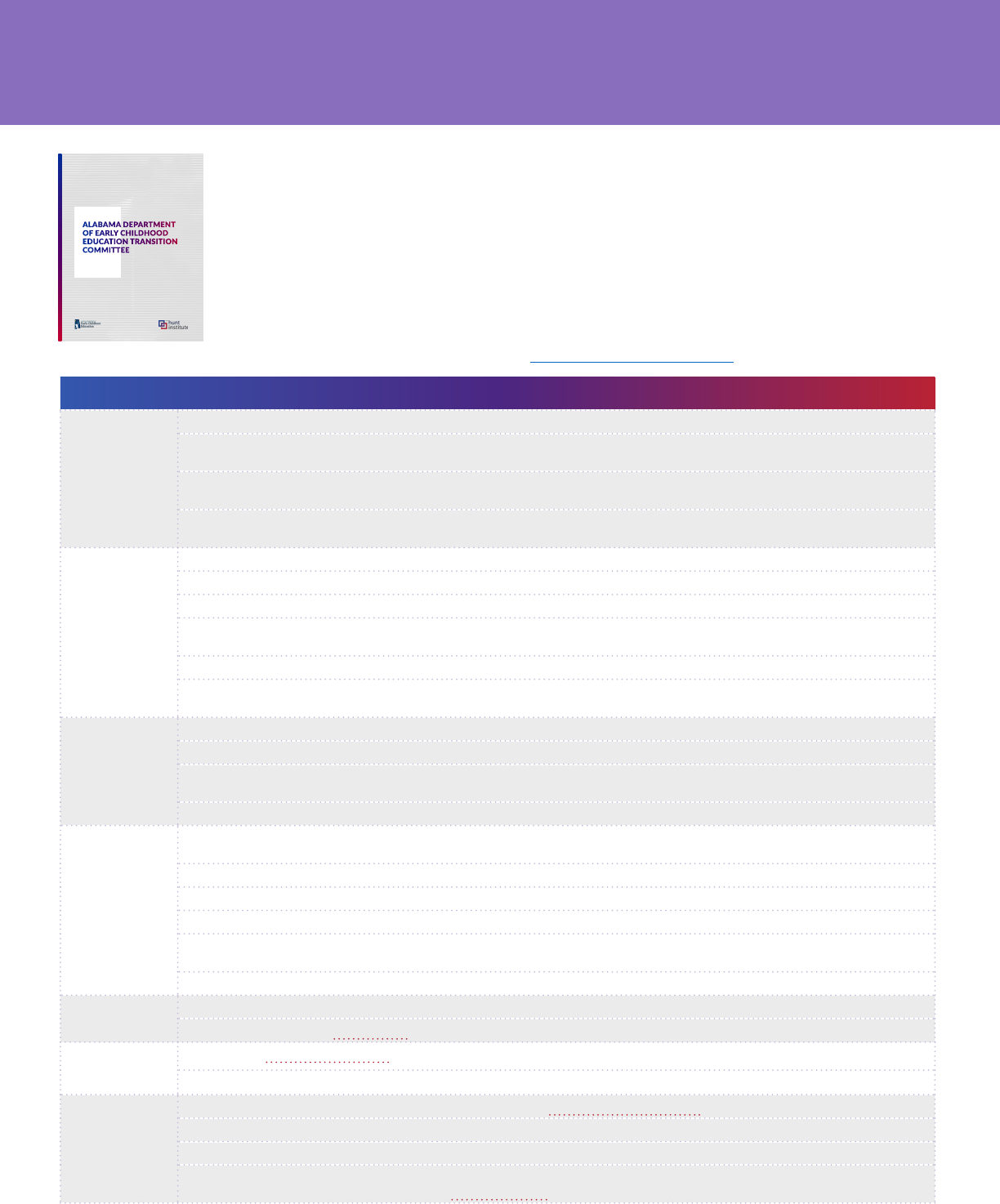
6 Alabama Department of Early Childhood Education
TRANSITION REPORT
After the leadership changed in July 2020, a committed group of education leaders and
advocates, chaired by Governor Kay Ivey and Representative Terri Collins, met from
October 2020 to January 2021 to help chart the future course for the ADECE.
Their work is complete and the seven priorities and twenty-eight key actions that they
identied will become a critical part of the strategic plan department leaders will use to
guide their work.
See the full report by visiting www.bit.ly/adece-report.
6ALABAMA DEPARTMENT OF EARLY CHILDHOOD EDUCATION TRANSITION COMMITTEE
TRANSITION COMMITTEE RECOMMENDATIONS:
EARLY CHILDHOOD PRIORITIES AND KEY ACTIONS
Over the course of its convenings, seven priorities emerged from the work of the ADECE Transition Committee,
each playing a critical role in shaping child and family outcomes in Alabama. These are:
1. Eliminate programmatic silos for increased collaboration and
coordination across Alabama’s early childhood programs.
2. Address generational poverty and mitigate its negative
effects on young children and families.
3. Increase program access, particularly for children in poverty.
4. Support and uplift the early childhood workforce.
5. Strengthen data collection and systems.
6. Increase developmental screening and access
to early intervention services.
7. Support early literacy.
Based on the Committee’s discussions, this report also outlines 28 associated key actions.
PRIORITIES AND KEY ACTIONS
Collaboration and
Coordination
1. Adopt a systems approach to collaboration and coordination across state and local jurisdictions, structures, and departments.
2. Increase public awareness of the prenatal to five developmental period and the benefits to families, communities,
and the public.
3. Develop and implement inclusive decision-making practices as the Department approaches planning, funding, policy, and
program implementation.
4. Explore opportunities for program consolidation/co-location that might allow for a more streamlined and coordinated
approach to early childhood governance in Alabama.
Generational
Poverty
5. Promote a comprehensive, statewide approach to addressing generational poverty.
6. Enhance family engagement across programs.
7. Increase access to parenting education and home visiting programs.
8. Promote state and local coordination between public schools, child care, and Head Start and Early Head Start to enhance
comprehensive services and two generational approaches.
9. Provide access to early childhood mental health consultation services for children, families, and educators.
10. Provide professional development across child care, First Class Pre-K, public schools, and Head Start on trauma-informed
approaches and social-emotional development.
Program Access
11. Increase access to First Class Pre-K.
12. Increase access to parenting education and home visiting programs.
13. Analyze data on infant toddler child care deserts to develop strategies for increasing access such as Early Head Start
Child Care Partnerships, increasing child care subsidy payments, and supporting family child care homes.
14. Increase subsidy payments prioritizing infant and toddlers.
Early Childhood
Workforce
15. Increase awareness of the value of the early childhood workforce and their social, educational, and economic importance
to our communities.
16. Implement realistic and supported workforce pathways for early childhood professionals by enhancing Alabama Pathways.
17. Increase public awareness of First Class Pre-K pay parity, seeking to extend this practice elsewhere.
18. Partner with NAEYC to pilot the Power to the Profession framework.
19. Develop a pay structure that supports tiered, equitable compensation based on credentials, certifications, and
lived experiences.
20. Expand access to early childhood coaches.
Data Collection
and Systems
21. Develop a coordinated and compatible data system to collect and connect existing data across multiple agency providers.
22. Expand the Alabama Family Central website.
Developmental
Screening and
Early Intervention
23. Enhance Help Me Grow Alabama.
24. Increase access to early intervention services for infants and toddlers with disabilities.
Early Literacy
25. Grow and support local grade level reading campaigns and Reach out and Read Alabama.
26. Engage and empower families on early literacy.
27. Provide professional development on evidenced-based early literacy practices.
28. Partner with Alabama Partnership for Children, Alabama Department of Human Resources, and the Alabama
Department of Mental health to promote Talk With Me Baby.
Over the coming pages, we explore each of these priorities and action steps in greater detail.
ALABAMA DEPARTMENT
OF EARLY CHILDHOOD
EDUCATION TRANSITION
COMMITTEE
FINAL REPORT AND ACTION PLAN

2020 Annual Report 7
Alabama Department of Early Childhood Education Transition Committee
Dr. Barbara J. Cooper, Secretary
Co-Chairs:
The Honorable Kay Ivey, Governor
The Honorable Terri Collins,
Alabama House of Representatives
Elected Members:
The Honorable Will Ainsworth,
Lieutenant Governor
The Honorable Vivian Davis Figures,
Alabama Senate
The Honorable Tim Melson,
Alabama Senate
The Honorable John Merrill,
Secretary of State
The Honorable Bill Poole,
Alabama House of Representatives
The Honorable Greg Reed,
Alabama Senate
The Honorable Rod Scott,
Alabama House of Representatives
The Honorable Bobby Singleton,
Alabama Senate
The Honorable Randall Woodn,
Mayor of Birmingham
Appointed Members:
Commissioner Nancy Buckner,
Alabama Department of Human
Resources
Dr. Scott Harris, State Health Ocer,
Alabama Public Health Department
Dr. Eric Mackey,
State Superintendent of Education
Alabama Leaders:
Ms. Katie Britt,
Business Council of Alabama
Ms. Tequila Smith,
Alabama Power Company
Ms. Mary Sibert Davis,
Alabama Association for
Early Care & Education (AALECE)
Mr. Matthew Durdin,
Alabama Farmers Federation
Dr. Alethea Fletcher Hampton,
Dean, College of Education,
Alabama State University
Dr. Peter Hlebowitsh,
Dean, College of Education,
University of Alabama
Mr. Ryan Hollingsworth,
School Superintendents of Alabama
Ms. Liz Huntley,
Attorney,
Lightfoot, Franklin & White
Ms. Amy Marlowe,
Alabama Education Association
Mr. Nick Moore,
Governor’s Education Policy Advisor
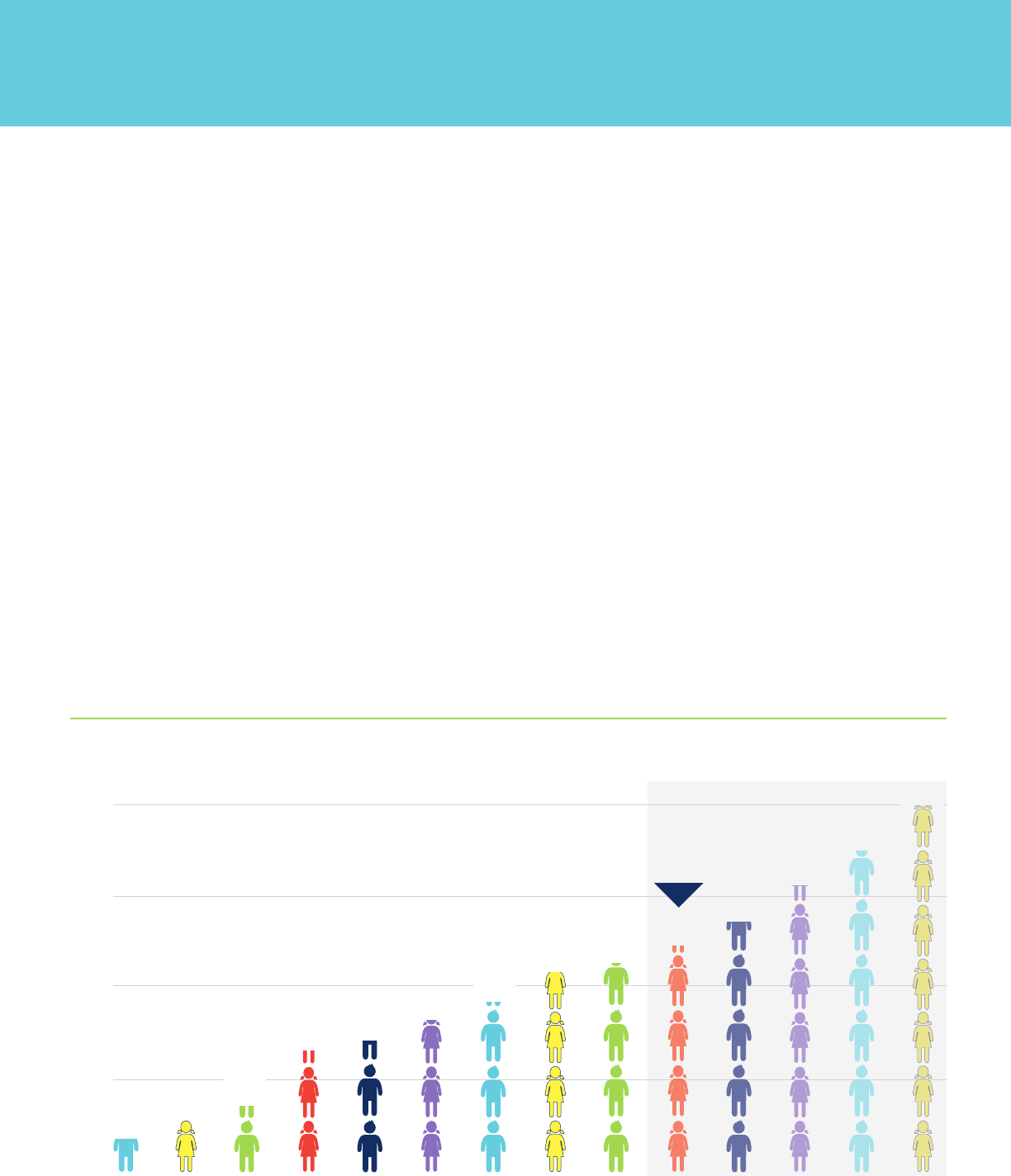
8 Alabama Department of Early Childhood Education
The Oce of School Readiness (OSR) administers
Alabama’s voluntary state pre-kindergarten program
known as Alabama First Class Pre-K. OSR, originally
established in the 2000 legislative session, provides
leadership for the enhancement of school readiness
for Alabama’s youngest residents. The First Class
Pre-K program is nationally recognized for quality,
and research shows that the positive eects of
Alabama First Class Pre-K persist through middle
school and beyond.
Through partnerships with advocates and the
National Institute for Early Education Research
(NIEER) at Rutgers University, Alabama’s Oce of
School Readiness established a plan to incrementally
increase funding for pre-k in Alabama, while
ensuring equity and protecting the quality for which
the program is recognized. From 2013 through the
2021 school year, the program has grown from 217
classrooms to 1,248 classrooms in a diverse delivery
system, including public schools, Head Start centers,
private childcare centers, private schools, faith-based
child care centers, and university child care centers.
Figure 1 below illustrates the growth of the program.
The primary goal of the Oce of School Readiness
is the expansion of First Class Pre-K while ensuring
that the highest quality is maintained. Alabama’s
voluntary pre-kindergarten program served
approximately 37% of the state’s population of
4-year-old children and their families in the 2020-
2021 school year.
First Class Pre-K provides the highest level of
education by also serving as a workforce development
initiative of the state. Each classroom funded by
OSR is required to employ two teachers – a lead
and an auxiliary teacher – each of whom are fully
credentialed in early childhood education and/or
child development. The lead teacher is required to
have at least a bachelor’s degree, while the auxiliary
teacher must have a Child Development Associate
(CDA) credential or comparable education. The
workforce development eorts do not end with
the qualications; programs receive funding from
ALABAMA FIRST CLASS PRE-K
Children with Access to First Class Pre-K
$24,416,485
increase for
First Class Pre-K
Projected
2013 2014 2015 2016 2017 2018 2019 2020 2021 2022 2023 2024 2025 2026
44%
50%
57%
70%
63%
6%
10%
12%
20%
24%
28%
70%
53%
35%
18%
31%
36%
37%

2020 Annual Report 9
the OSR to pay the teachers
comparable salaries to K-12
teachers and paraprofessionals
in school systems. The education
and compensation eorts support
pay parity and intentional
tools that ensure continuity
and expertise in the First Class
Pre-K program and ensure the
highest quality learning for the
participating children.
The OSR sta provide coaching,
monitoring, and professional
development for all programs
receiving funding. The laser focus
on classroom quality supported
by the OSR sta has proven ef-
fective in the short term and long
term outcomes for First Class
Pre-K students.
Early learning and
development standards
Comprehensive, aligned with state infant and
toddler and K-3 or college and career ready
standards, aligned with child assessments,
supported, and culturally sensitive
Curriculum supports Supports for curriculum selection
Teacher degree Lead teacher should have at least a
bachelor’s degree
Teacher specialized training Lead teacher should have educational
background specializing in pre-k
Auxiliary teacher qualications Child Development Associate (CDA) credential
or equivalent
Sta professional development At least 15 hours per year per teacher; individual
coaching and professional development plans
Maximum class size 20 or fewer
Sta-child ratio 1:10 or better
Screening and referral Vision, hearing, and health screenings and
referrals
Continuous Quality Improvement
system
Structured classroom observations; data
used for program improvement
The NIEER benchmarks that Alabama has a long history of meeting
are as follows:
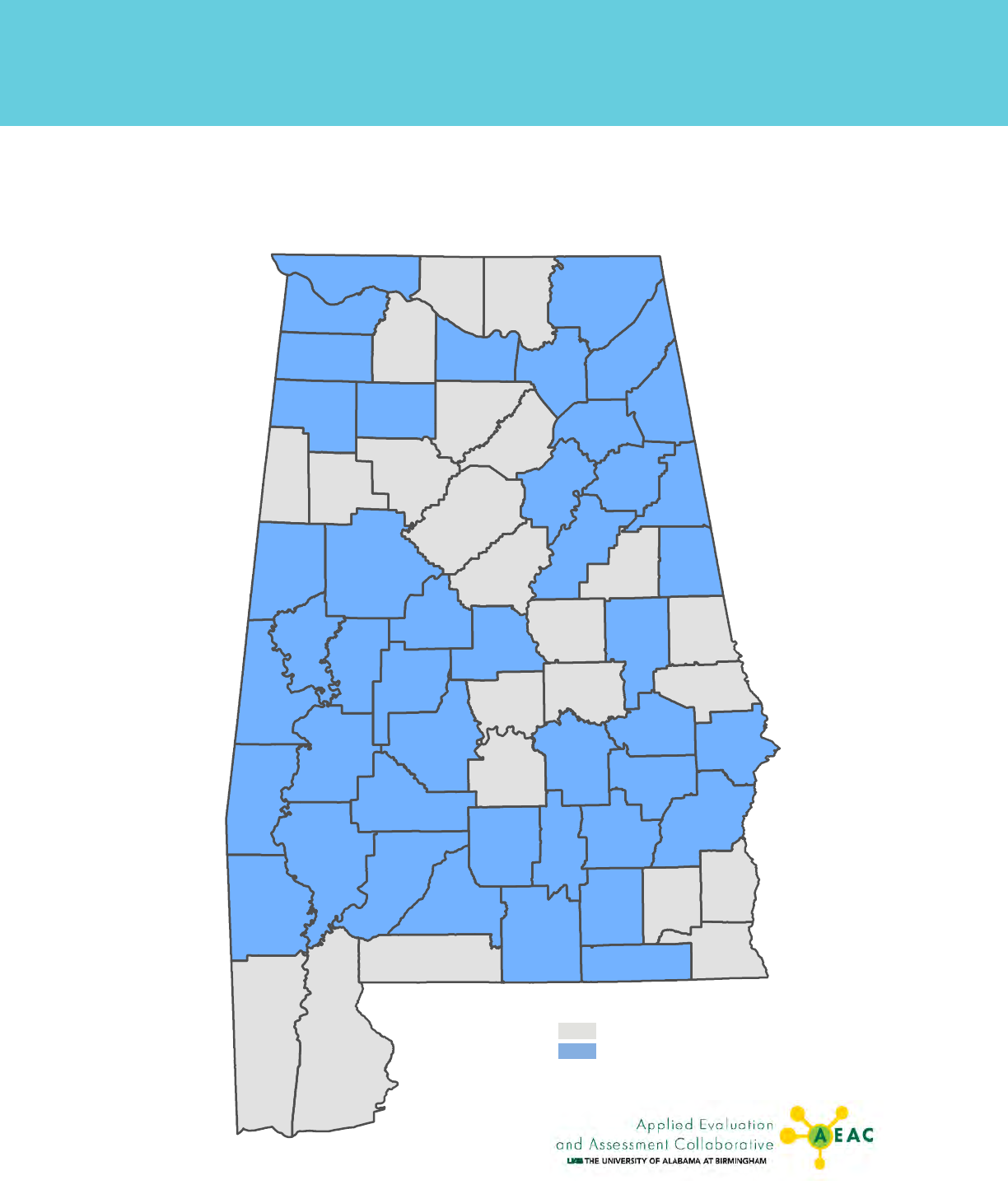
10 Alabama Department of Early Childhood Education
Baldwin
32%
Mobile
36%
Clarke
40%
Dallas
73%
Pike
41%
Hale
78%
Lee
17%
Clay
28%
Monroe
50%
Perry
40%
Wilcox
81%
Bibb
58%
Jackson
48%
Butler
92%
Dale
27%
Sumter
47%
Jefferson
29%
Tuscaloosa
47%
Walker
31%
Shelby
15%
Marengo
80%
Pickens
73%
Barbour
49%
Marion
38%
DeKalb
46%
Choctaw
41%
Coffee
40%
Coosa
35%
Covington
50%
Blount
13%
Escambia
35%
Chilton
53%
Lamar
34%
Henry
36%
Madison
35%
Conecuh
78%
Elmore
29%
Macon
51%
Washington
68%
Greene
62%
Cullman
10%
Russell
51%
Fayette
20%
Col
bert
57%
Bullock
56%
St. Clair
45%
Lowndes
29%
Franklin
54%
Morgan
50%
Winston
62%
Geneva
52%
Lawrence
36%
Etowah
38%
Marshall
46%
Calhoun
50%
Autauga
30%
Tallapoosa
44%
Houston
29%
Randolph
60%
Chambers
33%
Limestone
20%
Talladega
51%
Lauderdale
63%
Montgomery
40%
Cherokee
58%
Cleburne
40%
Crenshaw
57%
Percentage of four-year-olds with access to First Class Pre-K
2020-2021
Counties with less than 37 percent access
Counties with 37 percent access or more
ALABAMA FIRST CLASS PRE-K – ACCESS MAP
Percentage of four-year-olds with access to First Class Pre-K
2020 – 2021
Counties below state acess percentage
Counties at or above current state access (37%)
Baldwin
32%
Mobile
36%
Clarke
40%
Dallas
73%
Pike
41%
Hale
78%
Lee
17%
Clay
28%
Monroe
50%
Perry
40%
Wilcox
81%
Bibb
58%
Jackson
48%
Butler
92%
Dale
27%
Sumter
47%
Jefferson
29%
Tuscaloosa
47%
Walker
31%
Shelby
15%
Marengo
80%
Pickens
73%
Barbour
49%
Marion
38%
DeKalb
46%
Choctaw
41%
Coffee
40%
Coosa
35%
Covington
50%
Blount
13%
Escambia
35%
Chilton
53%
Lamar
34%
Henry
36%
Madison
35%
Conecuh
78%
Elmore
29%
Macon
51%
Washington
68%
Greene
62%
Cullman
10%
Russell
51%
Fayette
20%
Col
bert
57%
Bullock
56%
St. Clair
45%
Lowndes
29%
Franklin
54%
Morgan
50%
Winston
62%
Geneva
52%
Lawrence
36%
Etowah
38%
Marshall
46%
Calhoun
50%
Autauga
30%
Tallapoosa
44%
Houston
29%
Randolph
60%
Chambers
33%
Limestone
20%
Talladega
51%
Lauderdale
63%
Montgomery
40%
Cherokee
58%
Cleburne
40%
Crenshaw
57%
Percentage of four-year-olds with access to First Class Pre-K
2020-2021
Counties with less than 37 percent access
Counties with 37 percent access or more

2020 Annual Report 11
STRONG START, STRONG FINISH
The goal of Governor Kay Ivey’s education initiative
“Strong Start, Strong Finish,” launched in July 2017 is
to support a comprehensive approach of collaboration
that improves education from birth to the workforce.
This initiative focuses on and prioritizes three critical
stages of education: early childhood education,
computer science in middle and high school, and
workforce preparedness. Through Strong Start Strong
Finish, the ADECE is implementing Alabama’s
nationally-recognized First Class Pre-K model as a
bridge to develop and expand a birth to 8 continuum,
creating an alignment spanning Pre-K to 3rd grade
(“P-3”) and prenatal to age 3. Additionally, the
ADECE is supporting the governor’s call to action
by supporting ve pilot counties, Marshall, Macon,
Monroe, Jeerson, and Randolph, in implementing
local Campaigns for Grade-Level Reading to support
children in being procient readers by the third grade.
Alabama Pre-K- 3rd Grade Integrated
Approach to Early Learning
The ADECE and the Alabama State Department of
Education (ALSDE) are working together to align
instructional practices, assessment, and leadership
from pre-K to 3rd grade (“P-3”). This collaborative
partnership for the P-3 project will develop and
implement a strong teaching and learning continuum
unique to the needs and expectations of Alabama
children and families.
The Alabama P-3 Integrated Approach to Early
Learning works to ensure student success and
achievement gap closure by expanding access to the
high-quality First Class Pre-K program model and
taking the most successful parts of K-3 initiatives
to establish a strong foundation of early learning
experiences that promote student achievement and
success. In 2019-2020 the program expanded to
serving 125 classrooms, and in 2020-2021 supported
181 classrooms statewide. By the beginning of the 2021-
2022 school year, the P-3 program will have expanded
from an original 35 classrooms in the 2017- 2018
school year to approximately 218 classrooms statewide.
The goal of the P-3 program, moving into its fourth
year in 2020-2021, is to expand the early learning
continuum from First Class Pre-K through 3rd
grade. A high-quality early education provides the
foundation for student success in school. Having a
seamless learning continuum from pre-K through
3rd grade will align and integrate a comprehensive
educational approach to student learning during
the years when children have the greatest
growth potential. By applying their knowledge
of child development, subject matter content,
and pedagogical approaches to align educational
experiences along the P-3 continuum, educators
ensure that children enter classrooms that promote
their ongoing educational progress by building on
what they learned during the previous year.
Alabama P-3 Leadership Academy
The rst collaborative initiative of its kind in the
nation, the P-3 Leadership Academy is provided in
partnership with the Council for Leaders in Alabama
Schools (CLAS) and the National Association of
Elementary School Principals (NAESP). This high-
quality professional learning and resource program
meets the needs of elementary principals to lead P-3
learning communities. By partnering together, we
can provide a high-quality professional learning and
resource program to meet the needs of elementary
principals and pre-k directors serving our children in
their most critical age groups. The year-long program
cumulates in a Capstone Project that provides
participants with an opportunity to apply what they
have learned in their current setting.
This is the rst program oered through a
collaborative partnership with a national principal’s
organization, and the only such program that
participants, upon successful completion of the
program, receive a national certication credential. In
June 2018, the rst-ever such cohort in the country
to complete this national pilot program received their
Alabama P-3 Leadership Credential.
PRE-K THROUGH 3RD GRADE INTEGRATED
APPROACH TO EARLY LEARNING INITIATIVE

12 Alabama Department of Early Childhood Education
The initial Preschool Development Grant Birth
through Five (PDG B-5) grant was a federally funded
eort for states to conduct a comprehensive statewide
needs assessment and strategic planning. The ADECE
was one of ve states and the District of Columbia to
receive the largest of the federal awards. This federal
grant program, jointly administered by the U.S.
Department of Health and Human Services and the
U.S. Department of Education, is designed to support
states in creating and implementing a statewide
strategic plan for early childhood. The “Alabama
Connections for Early Care and Education” PDG B-5
grant lays out a vision that all Alabama children are
healthy and emotionally ready to enter kindergarten,
particularly low-income and disadvantaged children,
and that strong supports are provided to assist
families in making informed choices. This vision
recognizes that the birth to 5-year-old window is a
unique time in a child’s development. With more
than 95% of brain development occurring before a
child’s 6
th
birthday, the ADECE recognizes that the
needs are cognitive as well as social, emotional, and
health-related, and we must take advantage of this
time to positively impact brain development.
The comprehensive needs assessment completed
in FY20 through the initial PDG B-5 grant was the
product of a review of 59 existing needs assessments
and information from more than 450 key informants
and stakeholders. The Alabama Connections for
Early Care and Education Steering Committee
developed a comprehensive strategic plan based on
the identied strengths and needs of Alabama’s early
care and education system. This plan guides our work
in collaborating and coordinating the work across
Alabama’s early childhood systems.
While Alabama’s First Class Pre-K and First Teacher
Home Visiting programs are nationally recognized for
quality, a concern was raised in the needs assessment
about the lack of program accessibility statewide.
Program delivery of pre-k, as well as all other types of
early care and education, are challenges in rural areas
throughout Alabama. The greatest needs identied
through the needs assessment quantitative and
qualitative data collection are as follows:
BIRTH THROUGH FIVE
Identied Needs
• Access to high quality early learning programs,
particularly in high poverty and rural areas
• Lack of data about children ages birth to three
and their participation and needs for early care
and education
• High cost of childcare
• Transportation to early care and education
programs and services
• Child and family-focused data on programs and
services
• Aging buildings and physical structures housing
ECCE programs and services
• Increased funding for programs that have proven
success such as First Teacher Home Visiting,
including HIPPY and Parents as Teachers
• Coordination and collaboration in the
distribution of funding
• Transition from ECCE to K-12
• Collaborative data systems to measure quality
and accountability.
Strategies Underway
• Supporting Birth through Five Foundation sites
around the state where the Alabama Reective
Coaching model is being implemented in infant
and toddler classrooms;
• Improving the quality of classrooms through
enhancement of the learning environment;
• Increasing the number of teachers with early
childhood credentials through professional
development opportunities, stipends for teachers,
and pay parity with K-12 for degreed teachers;
• Development and launch of the Alabama Family
Central Website as a centralized resource for
programs and services in partnership with the
Alabama Partnership for Children; and
• Launch of the Born Ready Movement to raise
awareness among parents and to provide resources
they need to help children learn and be prepared
for kindergarten;
• Born Ready University for parents and babies was
piloted and will expand.

2020 Annual Report 13
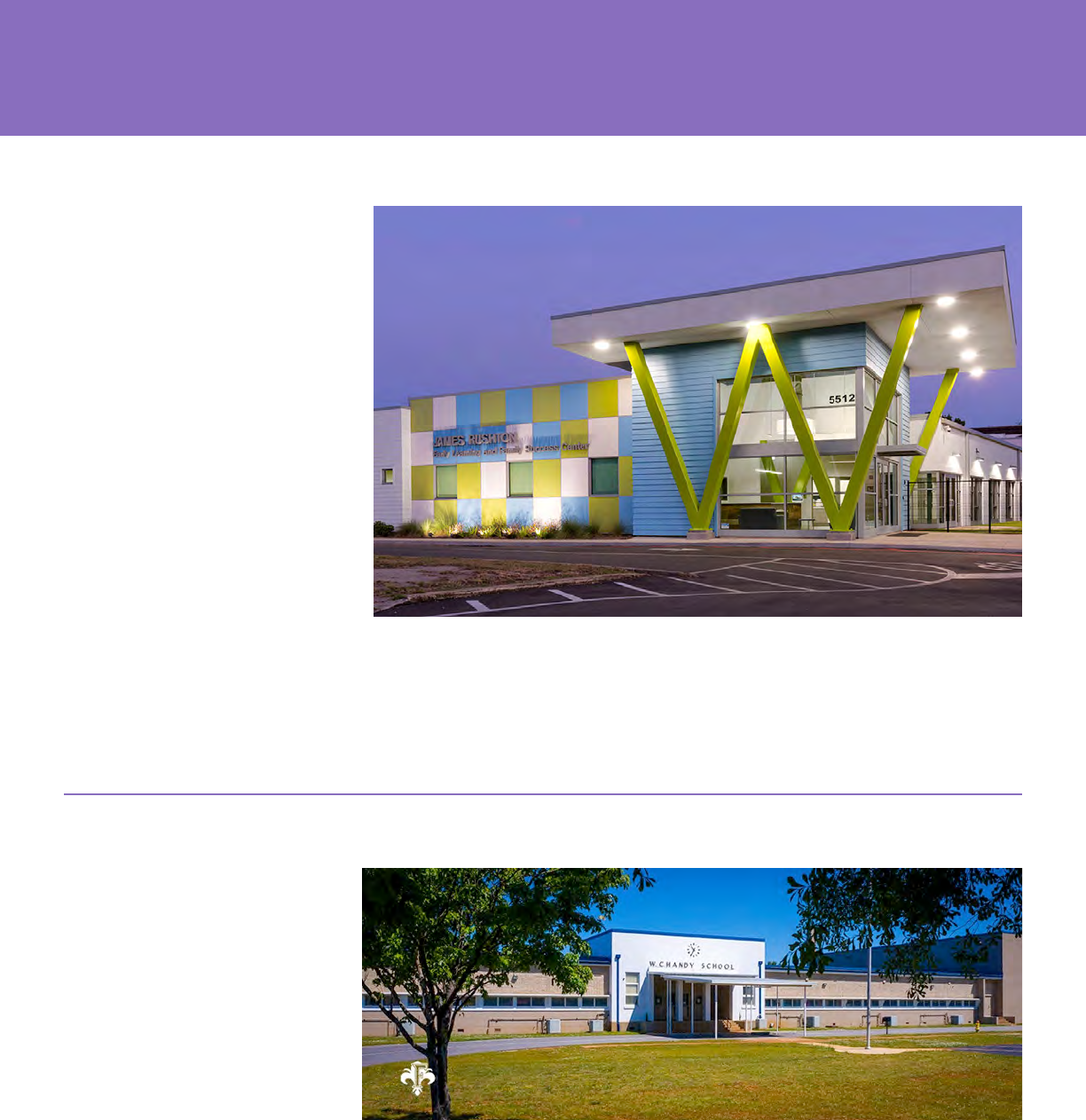
14 Alabama Department of Early Childhood Education
COLLABORATION SUCCESS
The ADECE is in a unique
partnership with the James
Rushton Early Learning Center
(JRELC) which opened its
doors in 2017 in the Woodlawn
community of Birmingham.
The JRELC is the entry point
to Woodlawn’s cradle to career
education pipeline serving
children and families in
Woodlawn and surrounding
communities. Through the PDG
B-5 grant program, the ADECE
provides funds for coaching
and professional development
support for teachers. The PDG B-5
initiative continues to allow the ADECE to work with
partners such as the James Rushton ELC to provide
the highest level of care and education to infants,
toddlers, and preschool children as well as to support
the Rushton Center’s eorts to improve the lives of
children and families. The JRELC has such a great
reputation and most recently attracted the attention
of and a visit from First Lady Dr. Jill Biden in 2021.
James Rushton Early Learning Center
W.C. Handy School
An active participant in
the First Class Foundation
Preschool Program, the W.
C. Handy School added four
new classrooms to its thriving
campus. Florence City School’s
newest Falcons included infants
and toddlers who range from six
weeks to three years of age. This
expansion was made possible
through Alabama’s PDG B-5
grant through the ADECE. The school’s principal, Dr.
Michael South, said, “the funding and support will
allow us the opportunity to provide a strong start for
more children and more time with our preschool-age
children.”

2020 Annual Report 15
First Presbyterian Church in
Tuscaloosa is one of many faith-
based organizations in our mixed
delivery system. Their birth
through ve program has ten First
Class Foundation classrooms
where children are learning
through play. As the children
are climbing on the playground, they are developing
hand strength that will help them as they learn
to write. They are developing language and social
skills as they play with jungle animals in the green
sand with a friend. With these same jungle animals,
the children gain a better understanding of and
appreciation of the beauty of wild animals in nature.
Pre-literacy skills are being learned as babies explore
the properties of a board book. Visual tracking that
will later aid in reading is developing as babies
admire their reection in mirrors. Through using
developing ne motor skills as they cut, children
are also gaining a better understanding of parts of a
whole as they manipulate the paper.
First Presbyterian Church, Tuscaloosa
The Coleman Center for Early Learning
The Coleman Center for Early
Learning is located on the Troy
University – Dothan campus. The
Coleman Center provides early
learning and care to children from
birth to age eight. This program
is an excellent place to pilot the
ADECE apprenticeship project.
The program design is modeled
after the ECE Unifying Framework
and incorporates the most current NAEYC
standards and competencies. All apprenticeships
involve two types of learning—on-the-job learning
(OJL) with a mentor and related technical
instruction (RTI) with a teacher. With the related
technical instruction aligned and clearly mapped
out, the pilot group began Spring semester of
2021, with three apprentices. Next steps include
expanding the pilot to other B-5 sites and then
other employers and educational partners,
including high schools.
9
James Rushton Early
Learning Center –
Birmingham
4
W.C. Handy -
Florence City Schools
10
First Presbyterian
Preschool - Tuscaloosa
5
Coleman Center –
Troy University –
Dothan Campus

16 Alabama Department of Early Childhood Education
The ADECE is the designated lead state agency for
home visiting in Alabama. Through the First Teacher
Home Visiting Program, the ADECE provides
home visiting in all 67 counties with the following
funding sources: Federal Maternal, Infant, and
Early Childhood Home Visiting funds from HRSA
(MIECHV); Alabama Medicaid Agency; Department
of Human Resources (DHR); Governor Kay Ivey’s
Infant Mortality Reduction Initiative (ADPH), and
the state’s Education Trust Fund (ETF). The First
Teacher Home Visiting Program focuses on 6 priority
areas:
• Improving maternal physical and mental
health
• Reducing physical abuse
• Improving treatment of children (including
health and nutrition)
• Promoting economic self-suciency for
families
• Educating families on how to use the
resources that are available to them in their
area
• Promoting school readiness
Home visiting in Alabama has improved the
coordination of services with other local agencies,
advisory boards, and children’s policy councils. The
models used, Parents as Teachers (PAT), Nurse
Family Partnership (NFP), and Home Instruction
for Parents of Preschool Youngsters (HIPPY), have
been successful in improving breastfeeding rates,
increasing school readiness, and enhancing the
ability to address mental health and behavioral needs
of families utilizing the infant and early childhood
mental health consultation (IECMHC) program.
Some programs may enroll pregnant women and
continue to serve the family until the child enters
kindergarten. Through regular visits, trained home
visitors assess families’ mental and physical health,
children’s development, and social support needs
and make referrals to services available in their
area, while also providing education and support to
promote positive health and social outcomes on the
home visits.
While the home is the primary setting for service
delivery, with the onset of the COVID-19 pandemic,
First Teacher Home Visiting programs pivoted to
provide remote visits utilizing technology, including
cell phones and iPads. This alternative way of
“visiting” with parents was especially benecial for
safety due to COVID-19. During the pandemic, First
Teacher Home Visiting was able to continue services
for families and continue connecting families with the
resources available in their community.
FIRST TEACHER HOME VISITING

2020 Annual Report 17
During the 2019-2020 First Teacher Home Visiting
Program year, over 3,400 families were served, and
over 54,000 home visits were conducted throughout
the entire state of Alabama. First Teacher serves some
of Alabama’s most vulnerable families. Nearly two-
thirds meet the federal denition for poverty and the
majority of those are in extreme poverty, 50% or less
of the poverty threshold. 65% of families served by
First Teacher Home Visiting are single-parent homes.
According to the 2020 MIECHV Needs Assessment,
19 of Alabama’s 67 counties meet the threshold
denition for “at-risk communities.” Two of
these counties have three at-risk domains, with
the remaining 17 having two at-risk domains. An
additional 28 counties have one at-risk domain. The
Needs Assessment used ve domains to determine
each county’s “risk.” Those domains were: low
socioeconomic status, adverse perinatal outcomes,
child maltreatment, crime, and substance abuse.
Alabama has enhanced the quality of home
visiting services to mothers and families through
Continuous Quality Improvement (CQI). CQI is
dened as a systematic approach to improving
processes and outcomes through regular data
collection, examination of performance relative to
pre-determined targets, review of practices that
promote or impede improvements, and application
of changes in practice that may lead to improvements
in performance. Since 2014, the Alabama First
Teacher Program has participated in CQI to improve
measures related to priority topics in home visiting,
such as tobacco cessation, well-child visits, and
maternal depression.
Our Parent Educator has been a total Godsend and I was so thankful to have her as our home teacher.
With my first pregnancy, I struggled with postpartum depression. And now being a stay-at-home mom,
I was afraid of that being the case with my daughter. It was the complete opposite. I breastfeed my
daughter and it was comforting knowing that our Parent Educator was so knowledgeable in breastfeeding
due to her experience. She has been able to provide so much information and resources not just for
my breastfeeding journey but different learning activities to do with my 4-year old. I try to find as
many activities as I can on my
own but as a mom, I’m telling
you, it is refreshing to have
someone help you along the
way. I have discussed my goals
and concerns about each of my
children and our Parent Educator
has helped me reach those goals
and work through any of the
concerns I have had. When I say I
highly recommend this program,
I mean it literally! My children
and I go on hikes and trips to the
park weekly and every time I meet
a mom with children, I tell them
about the program and pass along
the contact information.
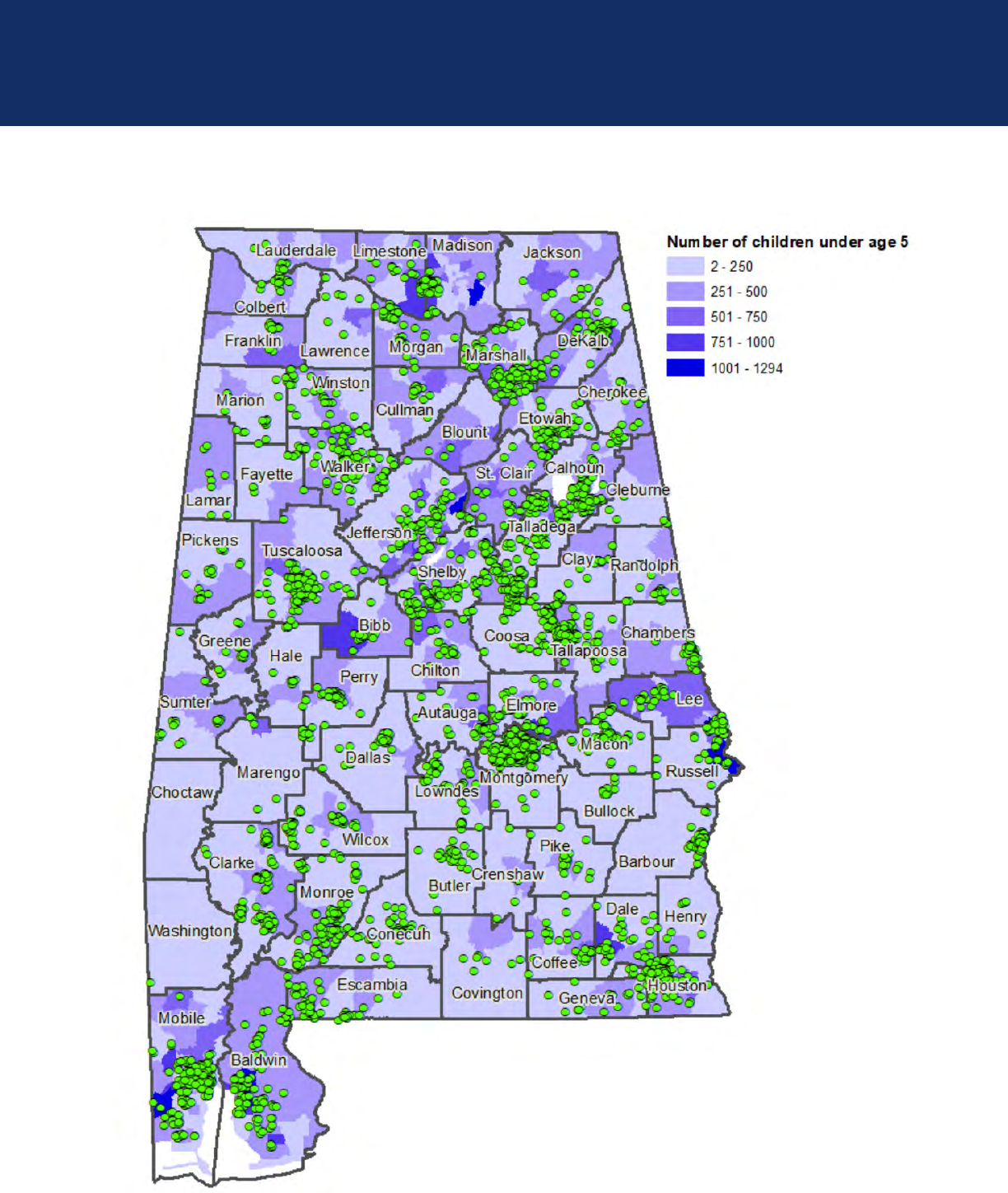
18 Alabama Department of Early Childhood Education
FIRST TEACHER HOME VISITING
Families Served by First Teacher Home Visiting Program, 2020

2020 Annual Report 19
The ADECE works in tandem with the Alabama
Department of Mental Health (ADMH) to support
collaborative eorts between state and non-prot
agencies serving children birth to eight years old
through the role of the Infant and Early Childhood
Mental Health (IECMH) State Coordinator position.
The IECMH State Coordinator serves as part of the
core leadership team working to create and sustain
a culturally sensitive system that promotes positive
early experiences through collaborative partnerships,
empowering families, and building capacity across
communities. In order for a comprehensive IECMH
system of care to exist, there needs to be a trained
workforce in place at every level of the state system
with funding streams to support that workforce.
Therefore, policies that create barriers to resources
need to be identied with new policy development that
will enhance and expand culturally sensitive evidence-
based practices across disciplines. The IECMH Policy
Team, consisting of the core leadership team and
members from Alabama Medicaid, work to address
gaps in access to mental health services for infants
and young children, birth to ve. Alabama is one of
20 states that is supported by the ZERO TO THREE
National Policy Center through technical assistance
activities supporting IECMH policy development on a
promotion-prevention- early intervention continuum.
This creates a comprehensive system of care that
addresses the mental health needs of infants, young
children, and families leads to improved overall well-
being, academic success, and a healthier Alabama.
Additionally, the ADECE continues to serve as a
founding partner and state agency representative
on the First 5 Alabama Board of Directors. First 5
Alabama, Alabama’s IECMH association, serves as
the holding space for the collective representing eight
state agencies, higher education, community mental
health, and home visiting. This dynamic group works
to promote workforce capacity and endorsement
activities. Because of our shared vision and mission for
the children and families in Alabama, we are able to
join forces to leverage funding to create a pathway to
long-term sustainability.
Over the last year, the global pandemic changed
the way we think about the delivery of professional
development for professionals and services to families.
Mental health was the number one issue identied in
the 67 counties through the Children’s Policy Council
Needs Assessment. Throughout this year we continued
to press onward and march forward for a better
tomorrow – together. We commit to stop blaming and
start healing.
• 100 Crisis Response Comfort Kits were
created to be distributed throughout the year
in the face of natural disasters or other extreme
adversity
• Infant and Early Childhood Mental Health
Consultation in First Class Pre-K was launched
during the COVID-19 pandemic – IECMH
Consultants responded to 71 requests for
mental health guidance in classrooms
• The Infant and Early Childhood Mental Health
Counselor Graduate Certicate through
Troy University was launch this year with
11 professionals from multiple disciplines
completing the program in the rst cohort
• The ADECE is a founding partner of First
5 Alabama supporting Endorsement
®
for
Culturally Sensitive, Relationship-Focused
Practice Promoting Infant and Early Childhood
Mental Health as a multidisciplinary group of
professionals with a total of 70 endorsees to
date:
o 8 – Alabama Early Intervention System
o 39 – Early Care & Education
o 4 – First Teacher Home Visiting
o 12 – Alabama Department of Mental
Health
o 3 – Institutions of Higher Education
o 4 – Policy
• 23 mental health clinicians trained in Child-
Parent Psychotherapy (CPP)
• 160 professionals across disciplines trained
in infant mental health theory and diversity
informed practices
• 65 professionals across disciplines received
Reective Supervision/Consultation from
endorsed supervisors as part of their professional
development
INFANT AND EARLY CHILDHOOD MENTAL HEALTH

20 Alabama Department of Early Childhood Education
OFFICE OF EARLY CHILDHOOD DEVELOPMENT
AND PROFESSIONAL SUPPORT
The quality of early care and education is vital to the
healthy brain development of young children. The
ADECE’s Oce of Early Childhood Development
and Professional Support (OECDPS) provides
coaching, support, and resources to child care centers
across the state. In partnership with the Alabama
Department of Human Resources, OECDPS works
to support and grow child care quality in Alabama
by providing supports directly to child care center
teachers, directors, support sta, children, and their
families.
Early Head Start – Child Care Partnerships
(EHS-CCP) Project
ADECE Quality Specialists provided specialized
coaching and mental health support for the federally
funded EHS-CCP classrooms in partnership with
Alabama’s Department of Human Resources (DHR).
Services provided to classrooms included:
• Curriculum assistance
• Professional development
• Support in child assessment administration
566
810
43
36
By the numbers:
Total number of children
service slots
Total number of children
served from October 1,
2019-September 30, 2020
Total number of Center-Based
Classrooms served
Total number of home and
group home providers served

2020 Annual Report 21
Family Engagement Project
The ADECE sta provided technical assistance
to 52 licensed center-based child care providers
to increase family and community engagement.
Specialized coaches worked with child care directors
to implement a family engagement rubric, a central
component of child care quality, to help centers
prepare for participation in Alabama’s Quality
Rating and Improvement System (QRIS). The Family
Engagement Project partner is the Alabama DHR.
Challenging Behaviors Project
In support of teachers of children ages birth to
ve years old, the ADECE implemented a program
designed specically for assisting with and preventing
challenging behaviors in the classroom. The project
utilizes a data-informed approach that focuses on the
social-emotional well-being of children and teachers.
100
Child care sites served
in 38 counties
2,123
Total Technical
Visit Hours
3,299
Consultation Hours
Total Participants in 2020
178
Conscious Discipline
Action Team (CDAT)
teachers in 89 First
Class Pre-K classrooms
54
CDAT teachers in 22
EHS-CCP classrooms
47
ADECE Coaches
observed by Conscious
Discipline Coaches
2,314
teachers and coaches
participated in CDAT
training
3,000
More than 3,000
educators attended
virtual session
with Dr. Becky
Bailey, developer of
Conscious Discipline,
at the annual Early
Childhood Education
Conference
Conscious Discipline State Implementation
Project
The Conscious Discipline approach is a nationally
recognized and evidence supported program
that provides structures and strategies within
early childhood classrooms to facilitate the
social emotional learning for children, classroom
management for teachers, and problem solving
for families and children. This research-based
program was delivered virtually as well as in-person
throughout 2020.
By the numbers:
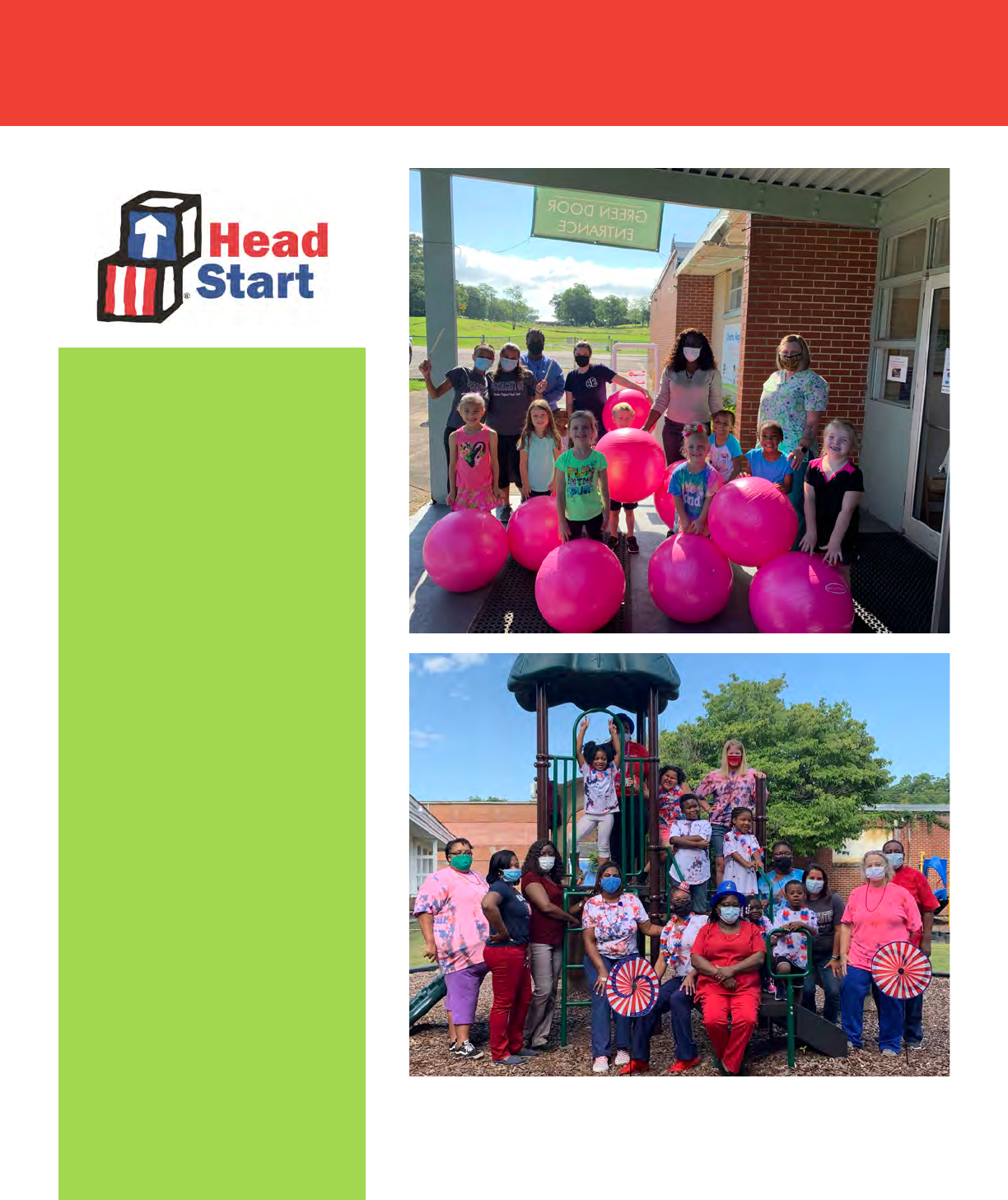
22 Alabama Department of Early Childhood Education
Head Start in Alabama provides
comprehensive, high-quality early
childhood education, health, and
nutrition services to low-income
children (prenatal through
age ve) and their families.
This federally funded program
promotes school readiness and
success by fostering parental
engagement and involvement
in their children’s education.
Head Start uniquely strengthens
families by connecting them to
community-based resources they
need to improve the family’s
overall well-being and quality
of life.
The Head Start Collaboration
Oce is located within the
ADECE and is federally funded to
support local Head Start grantees
as they partner with other early
childhood education agencies and
organizations to deliver services
that focus on childcare, school
readiness, transitions, physical
and mental health, education,
welfare, disabilities, teacher
development, homelessness,
community and family
engagement, and literacy.
Alabama Early Head Start and Head Start grantees have received a total of
$12,463.363 in federal funding from the Cares Act, administered through the
Oce of Head Start to help combat COVID-19. With this funding, some programs
oered summer learning programs to 4-year-olds transitioning to Kindergarten.
Head Start agencies that provided summer learning programs include Cheaha
Regional – Ashland and Talladega and Tuskegee/Macon Co. Head Starts.
HEAD START COLLABORATION OFFICE

2020 Annual Report 23
The state and local Children’s Policy Councils (CPC)
are vehicles for collaboration throughout the state.
The work of the Children’s Policy Council system is to
address community needs by facilitating children and
family service providers’ collaborations to develop
a community service plan inclusive of the health,
early care and education, parent/family engagement,
education, safety, and economic security needs of
children from birth to 19. The county-level Children’s
Policy Councils (CPC) are actively developing plans
and solutions to address their community’s most
pressing needs. The ADECE supports the work
through grant funding and sta involvement in
collecting data, facilitating meetings, and supporting
eorts to address community needs.
Each year, the local CPCs conduct a needs assessment
of their counties, and those needs assessments inform
the work of the state’s Children’s Policy Council that
also serves as the state’s Early Childhood Advisory
Council. The ADECE CPC sta assemble the local
needs assessments, analyze the data, and work with
the state CPC to create a report of the unmet needs
of children across the state. This report is presented
each year to the state Children’s Policy Council to
inform the work of the Children First Trust Fund.
Additionally, the ADECE facilitates the annual data
gathering for the Erin’s Law report in cooperation
with the Governor’s Task Force for the Prevention of
Child Sexual Abuse.
In recent years, the state Children’s Policy Council
and the local Children’s Policy Councils have
met together to share resources and facilitate
communication about needs and plans. The most
recent meeting was a virtual event in October of
2020, and brought together nearly 800 members
of local CPCs and community members as well as
members and representatives of the state CPC. This
annual conference was the result of county CPC needs
assessments that indicated a desire to bring state and
local resources together once a year for idea sharing
and collaboration to address needs at the state and
local levels.
The most recent collaborative eort of the CPCs
involves a focus on literacy across the state. Five
county CPCs are working with the ADECE as part of
the Alabama Campaign for Grade-Level Reading to
build upon existing eorts of supporting parents as
a child’s best and rst teacher through First Teacher
Home Visiting; promoting school readiness in First
Class Pre-K; preparing quality teachers through
early literacy professional learning; combatting
chronic absenteeism and the summer learning slide
with the Alabama Summer Achievement Program;
and addressing childhood poverty by integrating
and aligning supports with the Alabama State
Departments of Mental Health, Public Health,
Medicaid, Human Resources, and Education. The ve
counties are Jeerson, Macon, Marshall, Monroe and
Randolph. Their work and the data collected by the
ADECE will inform funding and implementation for
all counties in Alabama. A concerted focus on literacy
and grade-level reading is not just an education issue
but involves a collaborative focus on how best to
achieve outcomes.
CHILDREN’S POLICY COUNCILS &
CHILDREN FIRST TRUST FUND

24 Alabama Department of Early Childhood Education
To address a need identied by the Governor’s
Children’s Cabinet, the Alabama Family Central
(AFC) website was collaboratively created by state
agencies and other partners to support Alabama
families as a compilation and link to available
resources to assist with issues related to health and
well-being of children and families. The Alabama
Family Central website is a free, comprehensive, easy-
to-use website with mobile access that oers parents
and caregivers, families, and teachers a one-stop
connection to programs and services in Alabama.
Programs, tools and information on childcare,
education, family services and health services can all
be found on the site.
Governor Ivey highlighted the history of the
website’s development and its purpose during a press
conference on January 22, 2021 The press conference
video was shared across many partner agencies’ social
media accounts and a press release was submitted to
multiple media stations and released across Alabama.
Additionally, there was a marketing campaign that
included digital banners, billboards (both digital and
static), radio advertisements, video commercials on
social media, Google pay-per-click advertisements,
and audio streaming apps (i.e., Pandora and
Spotify). All regions of Alabama were targeted with
the marketing campaign. Finally, a webinar that
informed attendees on how to submit their services to
the website was held.
The launch activities and marketing campaign
eorts led to 2,888 website users (2,858 new users)
on Launch Day, January 22, 2021. In addition to
other activities, a media tour was conducted with six
interviews with news stations across Alabama. Within
the rst week after launch, there were 6,539 users,
6,476 new users, and 18,317 pageviews.
What’s next:
• Increasing site functionality,
data integrity, and improving
user experience within the
site
• Adding a platform for partner
social channels, Google
mapping, and dual search
functionalities (preserves the
Google-like experience while
oering the capability to
simultaneously search across
both programs and resources)
• Including translation services
in Spanish and Korean
• Surveying families to determine how to
improve
ALABAMA FAMILY CENTRAL
Excerpt from an email received through the AFC site from a
parent looking for help:
Hello,
My name is XXXX & I have a 2-year-old little girl & a
17-year-old boy. I am a newly single parent & am seeking
out all my options for childcare due to nancial issues.
I was looking into getting my daughter into the Daycare
at a discounted price and sometimes at no cost. I was
reaching out in hopes that someone could point me in
the right direction on where to go for this program or if
I could get an application sent over? If that is an option,
let me know where to bring it/send it back. Thank you
for all your help.
_______
Response from the Help Me Grow Care Coordinator who
provided assistance:
Good Morning,
I was able to connect the family to HMG. During intake,
mom stated that she was a single parent, and she
needs support after getting over the divorce. Intake
is complete and the family has been assigned a Care
Coordinator. Thank You!
The Alabama Family Central website is managed by the
Alabama Partnership for Children and includes the following
agency partners:
• Oce of the Governor of Alabama
• A+ Education Partnership
• Alabama Department of Child Abuse and Neglect
Prevention
• Alabama Department of Early Childhood Education
• Alabama Department of Education
• Alabama Department of Human Resources
• Alabama Department of Mental Health
• Alabama Department of Public Health
• Alabama Department of Rehabilitation Services
• Alabama Medicaid
• Alabama Oce of Information Technology

2020 Annual Report 25
MAP OF SERVICES
Alabama Department of Early Childhood Education
Funded Programs 2020 – 2021
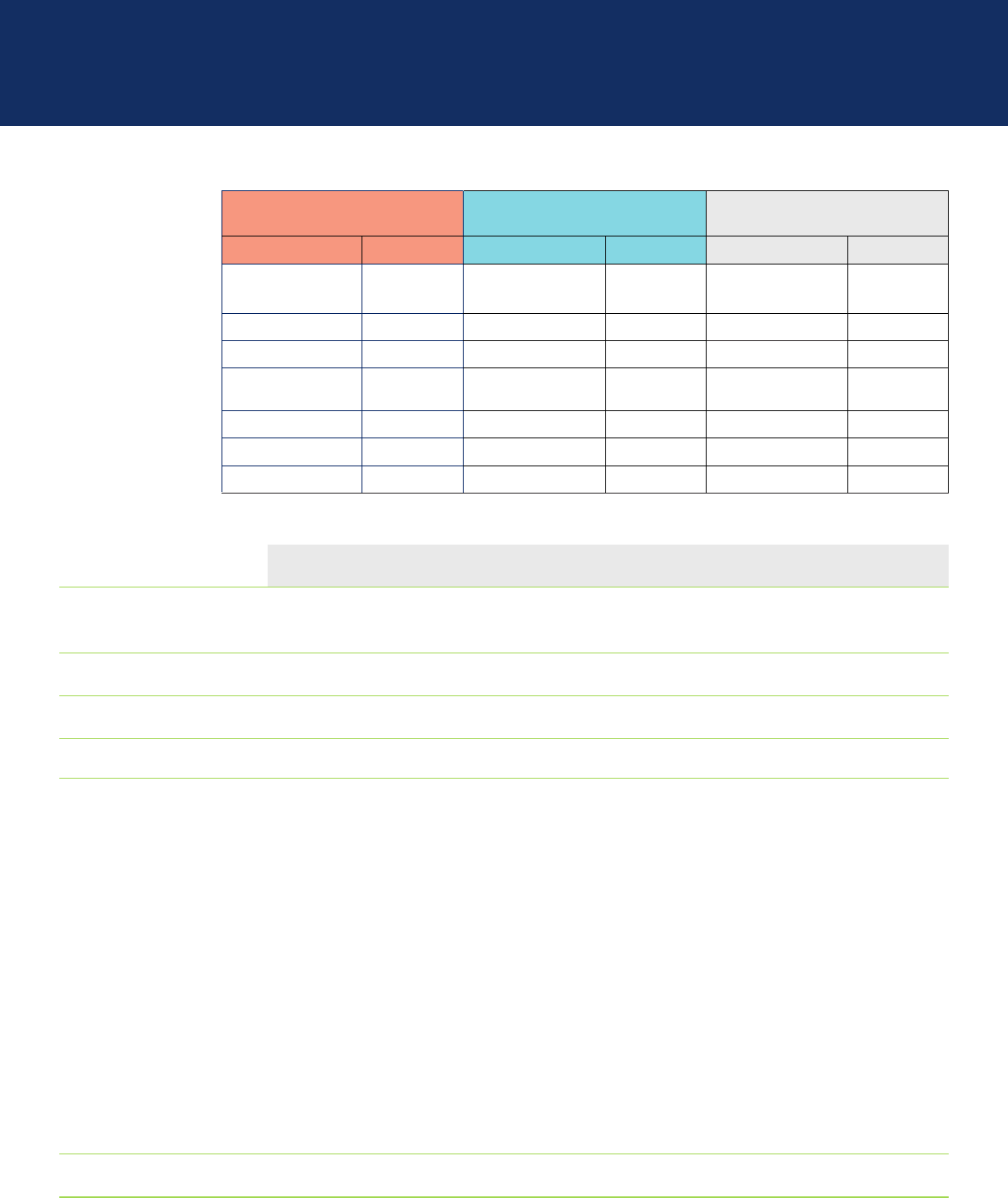
26 Alabama Department of Early Childhood Education
Amount Percentage
Personnel Costs &
$12,917,831 9%
👧
Employee Benets
Operations $1,576,869 1%
🏛
Services $6,742,284 4%
Supplies & Materials $1,642,519 1%
📏
Program Funding $130,043,268 85%
Total $152,922,770 100%
FINANCIALS
ADECE Uses of Funds, FY 2020
STATE EXPENDITURES
FEDERAL &
OTHER EXPENDITURES TOTAL EXPENDITURES
Amount Percentage Amount Percentage Amount Percentage
Personnel Costs &
Employee Benets $11,006,185 8% $1,911,646 10% $12,917,831 9%
Operations $1,372,341 1% $204,527 1% $1,576,869 1%
Services $5,161,264 4% $1,581,020 8% $6,742,284 4%
Supplies &
Materials $815,100 1% $827,418 4% $1,642,519 1%
Program Funding $115,855,497 86% $14,187,771 76% $130,043,268 85%
TOTALS $134,210,388 100% $18,712,382 100% $152,922,770 100%


Dr. Barbara J. Cooper, Secretary
P. O. Box 302755
Montgomery, Alabama 36130-2755
(334) 224-3171
children.alabama.gov
ALABAMA DEPARTMENT OF
Early ChildhoodEarly Childhood
Education
Education
